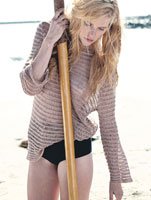Tee Shift
Brands look to T-shirts for rebirth, growth.
Gearing up for Spring 2011, a handful of contemporary brands are staking their futures and growing their brands on the strength of their T-shirt business.
“Everyone has stacks and stacks of T-shirts. We all wear them all the time—except for maybe [Vogue editor] Anna Wintour,” said Vanessa Knowles, general manager of Whitley Kros, the contemporary collection that bowed out of the retail scene for one season before reintroducing itself for Spring 2011 as an art-inspired T-shirt line. “Even when they are being cautious [with their spending], women will buy T-shirts because they are staples; they can live in them. They’re like jeans in that way,” Knowles said.
Emily Goldstein, co-owner and buyer of the Madison chain of better specialty stores, said she’s always on the lookout for T-shirts. “T-shirts play a very important role in Madison’s business. They represent a good chunk of my business—approximately 20 percent,” she said. Madison—which sells brands such as Yigal Azrouel, Missoni and Halston Heritage—stocks T-shirts from a slew of sources, including Alexander Wang, Minden Chan, Kain Label and Elizabeth and James. “T-shirts are a go-to item; they’ll never be obsolete.”Back to basics, then beyond
For Whitley Kros founders Marissa Ribisi and Sofia Coloma, culling the line back to the least-expensive and most-accessible item was the only way to avoid shuttering the brand. “T-shirts always did well for us. We enjoyed designing a full line, but right now is not the time for us to do a full fashion collection. The market is inundated hellip; and the number of stores that can afford to make the buys [that a collection] would need has shrunk,” Ribisi said. Wholesaling for $33 to $40, the T-shirts are breezy, versatile and priced to sell. “So far the reaction from retailers has been great,” she said.
Despite her concerns about the economy, Ribisi has hopes that Whitley Kros’ new incarnation will spur growth for the company—but not necessarily in the direction of its past life. “T-shirts are the best way to maximize our brand right now. I think we’ll stick with the more casual stuff, possibly expand into men’s T-shirts and kids’ T-shirts, maybe hoodies, before we consider becoming a full collection again.”
Whitley Kros, which debuted its music-inspired collection of T-shirts at Directives West’s “First L.A.” fashion show during Fashion Market, isn’t the only brand using T-shirts as an incubator for a faltering contemporary business.
Minden Chan, a Los Angeles–based designer who, four seasons ago, morphed his eponymous contemporary sportswear collection into a T-shirt collection, said T-shirts were never a significant part of his business before the recession. “I had one or two basic T-shirts,” he said. His collection—which sold in retailers such as Barneys New York, Fred Segal, Steven Alan and Harvey Nichols—was mostly devoted to tailored wovens, crisp blazers, silk dresses and luxe outerwear. But when the recession hit, demand for his designs, which were at the upper levels of contemporary pricing, dried up. “Fewer stores were buying the more expensive items—and, at that time, that was our focus,” Chan said. T-shirts, despite being underrepresented in his collection, became the focus.
With 10 to 15 styles per season and wholesale prices ranging from $35 to $65, Chan found that T-shirts opened up his distribution and helped him forge relationships with new stores. Now, Chan is making moves to cash in on the success of his T-shirts.
“The goal is to become a full collection again,” he said. For Spring 2011, Minden Chan grew to include lightweight cashmere sweaters and slim blazers, timing their introduction to coincide with what Chan perceives as a slowly recovering contemporary market. Fall 2011 will see the addition of more cashmere layering pieces and novelty blazers. Eventually, Chan plans to introduce trousers and dresses and phase out some of his focus on T-shirts. “I am already seeing retailers buying the more expensive things. The cashmere has been a bright spot for us, and that is quite encouraging,” he said. Madison, which carries Minden Chan, placed a bigger order for the brand’s sweaters than for its T-shirts for Spring, Goldstein confirmed.The brand that T-shirts built
Like James Perse and Ella Moss before them, Los Angeles–based Kain Label is using T-shirts as a launching pad for its expansion into a full contemporary collection.
The brand, co-founded by sisters Melanie and Amanda Kain in 2008 as a four-piece T-shirt collection, has been steadily growing its offerings and distribution. Spring 2011 marks Kain Label’s latest and greatest strides into the realm of a full lifestyle brand. The season features a deeper selection of matte jersey dresses, open-weave knits, and the introduction of chiffon and linen terry fabrications for a variety of silhouettes, Melanie Kain said. “2011 is a big turning point for us. For Fall 2010 we added cashmere and merino wool and got a great response. We’re gaining confidence.”
The brand’s dramatic growth was made possible by the strength of its T-shirt business. “They’re our workhorses,” Kain said. Sold online at Net-a-porter.com and Shopbop.com as well as specialty retailers and majors nationwide, Kain Label has “truly defied the [down] economy,” Kain said. “It turns out that T-shirts have been the Holy Grail,” she joked, referring to T-shirts helping a company thrive during a recession. “We didn’t know what we had when we started.”
Quality control for each added category is a big focus for the brand, which produces domestically. The biggest challenge, however, has been pacing the brand’s growth with the goal of creating long-term success, Kain said. “We stayed small for a really long time. It was a tough balance to grow without blowing out our distribution and avoid being trendy or a one-hit wonder.”
Now with retailers readily buying new and pricier categories from Kain Label, it appears that diligence is paying off—and, possibly, just in time. Madison’s Goldstein said she has begun to notice a subtle shift away from T-shirts. “Women are beginning to look for something a little more special than a T-shirt,” she said.
























